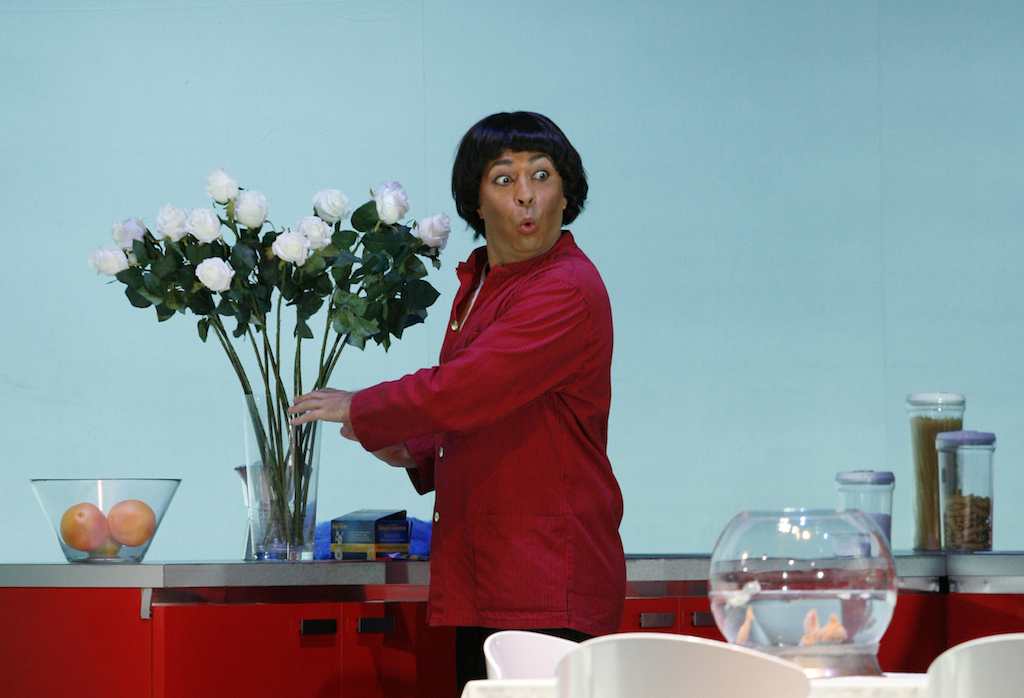In honor of Rossini’s birthday!

We are reposting this in honor of Rossini’s birthday!
We’re also including a picture of Paolo in one of our favorite roles ( he almost “owns it”)
Below is our interview with Paolo Bordogna who graciously agreed to answer our questions while in the middle of his run of performances in Il Barbiere di Siviglia at the Opèra Bastille in Paris.
His answers appear in the original Italian, followed by a rough translation.
Q. You are a “graduate” of the Accademia Rossiniana (1998 I believe) what
was the experience like for you then, and what do you feel about it today?
A. E’ stato molto tempo fa, era molto bello confrontarsi con altri giovani
artisti sul linguaggio musicale di Rossini. Fin da subito potevi capire chi era
in grado di cogliere lo spirito “rossiniano” e chi invece era li per fare un’
Accademia che avrebbe potuto portargli una “vetrina” in più per farsi notare…il
tempo e lo studio sono “galantuomini” e prima o poi portano alla “verità”. La
prima vera Accademia la si fa con noi stessi, quando ci mettiamo di fronte ad
un capolavoro che dobbiamo saper leggere, analizzare e poi interpretare. Per
far questo si ha bisogno di tecnica, tenacia e umiltà, sempre!
Yes, it was a long time ago. It was such a joy to confront oneself with other young singers on the musical language of Rossini. From the very start you could tell who was capable of catching the “Rossinian” spirit, against those who where there only to use the Accademia as a show case to be noticed… Time and study are “gentlemen” and will eventually tell the “truth”.
The first real Accademia is the one we do with ourselves, when we confront a masterpiece that we have to learn to read, analyze and perform. To achieve this we need technical skills, persistence and humility, always!
Q. You have been a mainstay of many ROF performances. We won’t ask
you about which one you like best, but if you have a favorite, please tell
us!!
A. Ho cantato al ROF dal 2005 al 2014, (questa estate!). Tra le mie opere
preferite di Rossini c’è senza dubbio Cenerentola, ma nel mio cuore resterà
sempre il dolce Germano della Scala di Seta, che ho cantato in tanti altri
teatri, anche alla Scala di MIlano.
Sono molto legato a quest’opera perchè ho partecipato in prima persona all’
idea registica di questo personaggio con Damiano Michieletto. Io continuavo a
domandarmi come fosse possible che un personaggio definito “sciocco” da Rossini
stesso ad un certo punto dell’opera cantasse una delle arie più difficili e
allo stesso tempo meravigliose che Rossini abbia mai scritto per un buffo? Un’
aria che parla d’amore, con frasi lunghissime ed eteree, da far invidia a
qualsiasi “tenore larmoyante” e romantico? Doveva esserci un motivo a tutti
“misunderstanding” che si creano nella trama, che non fosse semplicemente colpa
della sua sciocchezza! Un’idea di “buffo moderno” deve togliere tutte le
“croste” del passato su questi personaggi che altrimenti risultano sempre
grotteschi, esagerati nella recitazione, e dalla mano pesante sulle caccole
dalla risata facile. La mia idea di comicità si ispira a Chaplin, a Totò, a
Jack Lemmon, ad Alberto Sordi o a Walter Matthau.
Così chiesi al regista che per favore non si fermasse all’aspetto “esteriore”
e semplicistico della “stupidità” di Germano, ma che mi aiutasse a trovare un
motivo per cui Germano non capisce mai le cose che gli si dicono, creando tutta
quella serie di malintesi che danno poi vita alla farsa. Fu così che decidemmo
di farlo “straniero”, e trasformammo il “servo sciocco” della farsa del primo
‘800 in un modermo “butler” di orginine orientale in un moderno loft di Parigi.
Cosi erano la lingua e la diversità culturale a creare problemi, non la
stupidità!
Il personaggio lasciò un segno incredibile sul pubblico, moltissimi lo
amarono, molte signore mi fermavano per strada chiedendomi di andare a casa
loro a stirare. Perchè proprio il momento più toccante di Germano è quando
canta l’aria “amore dolcemente”, e nella nostra produzione, lo facevo stirando
e guardando la TV…da solo, io e un piccolo pesce rosso nel suo piccolo
acquario. Una condizione di estrema solitudine che molte donne avranno provato
facendo le faccende domestiche ma anche molti immigrati in terra straniera.
Sentivo che, nel mio piccolo, stavo dando un segnale “sociale”: chi sembra
diverso da noi non va mai escluso, va compreso e amato proprio perchè
“diverso”!
I sang at ROF from 2005-2014 ( this summer!) . Rossini’s opera, “La Cenerentola” is without a doubt my favorite, but the sweet Germano from “La Scala di Seta” will always be in my heart. I’ve sung it at many theaters, including La Scala in Milan.
I’m very attached to this opera because I participated personally in the creation of this character along with Damiano Michieletto ( the director of the ROF production). I kept wondering how it was possible that a character called “silly” by Rossini himself at one point could sing one of the most difficult and at the same time beautiful arias that Rossini had ever written for a “buffo”. An aria that speaks of love with long an ethereal phrases, that would be the envy of any romantic tenor?
There had to be a reason for the “misunderstandings”that created the plot, it could not simply be the fault of the “silly character”. The idea of a modern “buffo” which would remove all the “scabs” of the past of these characters that otherwise have grotesque, exaggerated acting and heavy-handed boogers resulting in an “easy laugh”. My idea of comedy is inspired by Chaplin,Toto,Jack Lemmon,Alberto Sordi and Walter Matthau.
So I asked the director not to be limited to the “external” and simplistic “stupidity” of Germano, but to help me find the reason why Germano never understands things that said and as a result creates the series of misunderstandings that give life to the farsa. So we decided to make him a “foreigner” and transformed the “foolish servant” of the farsa of the 1800’s to a modern butler of oriental origin in a modern Parisian loft. That way it was the language and the cultural differences that created the problems, not the “stupidity”
The character left an incredible mark on the audience. Many loved it. Many women stopped me in the street asking me to come home with them to do their ironing ( ed note. One really has to see this production to appreciate this comment – fortunately it is commercially available on DVD) Because the most touching moment is when Germano sings the aria “Amore dolcemente”, and in our production is ironing while watching TV. – alone. Me and a small goldfish in his small aquarium. A condition of extreme loneliness that many women have experienced doing household chores – but also many immigrants in a foreign land. I felt that I was making a point about society: he who seems “different” should never be excluded, but should be understood and loved for being “different”.
Q. Your performance in Matilde di Shabran was a tour de force –
particularly with all that Neapolitan dialect. I remember Italians in the
audience being quite impressed. Was it particularly difficult to sing this
role because of the language?
A.Oh, non per me! La mia famiglia è per metà napoletana, io parlavo il dialetto
napoletano con mia nonna Rosa e mio nonno Vitantonio! E badate, il dialetto che
parlavo con mia nonna già non esiste più. Il dialetto moderno napoletano è
molto cambiato. Perciò quando ho cominciato a studiare la Matilde ho ritrovato
molti termini del dialetto antico che parlavo con i miei nonni.
La cosa che mi stupisce e che tutti notarono questa cosa del dialetto e
nessuno si è accorto che ho cantato più sol acuti che in una cavatina di Figaro
del barbiere di Siviglia!! (meglio così, se l’ascolto è “facile” vuol dire che
il “cantato” è ben fatto!)
Oh, not for me! My family is half Neapolitan. I spoke the Neapolitan dialect with my grandmother Rosa and my grandfather Vitantoni! And mind you the dialect I spoke with my grandmother no longer exists. The modern Neapolitan dialect has changed a lot. So when I began to study “Matilde” I found many terms in the ancient dialect I spoke with my grandparents. The thing that amazes me is that nobody noticed that I sang more high G than in a single aria of Figaro in the “Barber of Seville”!! Just as well – if the listening is “easy” it means that “singing” is well done!
Q. Last summer’s “Barbiere” was in collaboration with the “Accademia di
Belle Arti di Urbino”. What was it like to work with all those enthusiastic
young people?
A. La cosa più bella e che mi fece commuovere fu che tutti questi giovanissimi
scenografi, per fare questo lavoro avevano imparato a memoria il barbiere e lo
cantavano sempre nelle pause, per le scale, nelle strade…!!
The most beautiful thing and the thing that moved me was that all these young designers in order to do this work, had memorized “Il Barbiere “ and always sang during breaks, on the stairs, in the streets!!!
Q. Your performance as “Mama” in “Le convenience ed inconvenience
teatrali” by Donizetti is unforgettable. Thank goodness it is on DVD. Can
you explain to people who know nothing of singing how different it is to
sing Donizetti and Rossini?
A. Uno dei ruoli più divertenti che abbia mai cantato e che mi ha dato anche la
possibilità di fare un vero balletto classico sulle punte!! Adoro le sfide! E
non vedo l’ora di poter rifare questo ruolo. Il prossimo appuntamento è al
Maggio Musicale Fiorentino l’anno prossimo!
Donizetti ha in genere un’orchestrazione più ampia, ma sostanzialmente lo
stile, dal punto di vista vocale è molto simile. Entrambi sono portatori sani
di “belcantismo” e fanno bene alle voce! Ci sono poi differenze sullo stile
delle cadenze per esempio o su come affrontare una variazione, o sulla
diversità di “staccato”, ma rischierei di essere troppo tecnico e non voglio
annoiarvi!
It’s one of the most fun roles I’ve ever sung and it also gave me the opportunity to dance true ballet on pointe! I love challenges! I cannot wait to be able to redo this role. The next time will be at the Maggio Musicale Fiorentino next year!
Donizetti’s orchestration is typically larger, but essentially the style, from the point of view of the voice is very similar. Both are true embodiments of “bel canto” and are good for the voice. There are also differences in style – cadenzas, for example, or how to approach variations, and differences in “staccato”, but I risk being too technical and I do not want to be a bore.
Q. Finally, we understand that you are coming to the US! Please tell us more!
A. Si, sono così felice! Debutterò alla Washington National Opera il prossimo
maggio 2015 con Cenerentola!! E vi posso anche anticipare che per allora sarà
pronto il mio primo CD solistico di arie d’opera che ho appena inciso con
Decca. Nel disco ci saranno tutti mi miei amati personaggi, da don Magnifico a
Mamma Agata, da Beaupertuis a Gianni Schicchi…e molte sorprese!
Yes, with pleasure. I will debut at the Washington National Opera in May 2015 with “Cenerentola” And I also expect that at that time my first solo CD of opera arias with Decca will be ready. It will feature all my beloved characters, from Don Magnifico to Mamma Agata, from Beaupertuis to Gianni Schicchi.. and many surprises.
We thank Paolo Bordogna for this interview and invite you to visit his website,www.paolobordogna.eu. Follow him on Twitter @BordognaPaolo and visit him on Facebook.
